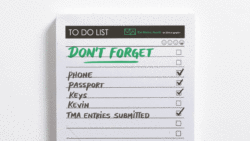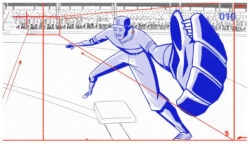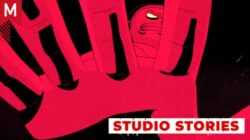Editor’s Note: For our new series Being Queer in… we’ve hand-selected some incredible people to tell their stories and give us candid accounts of the queer experience in the creative industries. Being Queer in… is inspiring, raw, and dripping with authenticity.
For Being Queer in… Music we hear from UK musician Dylan Holloway. Dylan discusses how his experience as a trans guy led him into a life in music, why being labeled as “gay” was easier for people to understand, and how lockdown changed everything.
Radiating positivity from the beaches of Cornwall to his sold-out London shows, this is a must-read for the LGBTQIA+ community and its allies.
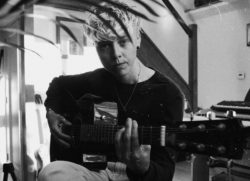
From around the age of three or four, I grew up with the internal certainty that I was a boy. I was sure of it, I knew it, but there was one big problem, I was born inside a girl’s body.
Where do you start?
How do you begin to process this, let alone announce it to anyone else, when no one around you, in fact, no one you’d ever heard of, felt this way?
I developed a method of “telling people, without telling people.”
Whether it was in the clothes I bought, the toys I played with, the nicknames I cultivated, I’d use every opportunity to be “one of the boys.” I hung around with boys; I used the boys’ bathroom, and I absolutely had to have a boys’ haircut.
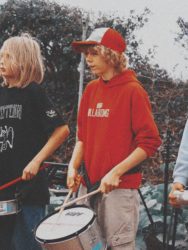
“From around the age of three or four, I grew up with the internal certainty that I was a boy. I was sure of it, I knew it, but there was one big problem, I was born inside a girl’s body.”
Despite the inner conflict, I had an enjoyable childhood. I was always surrounded by loads of friends, and fortunately, I had an older (and very girly) sister. I think this took the pressure off me a bit, and perhaps my parents, who were super cool with my whole ‘tomboy’ thing. But even still, I always had this underlying feeling of lonesomeness and secrecy.
It may sound magical, but growing up on the beautiful Cornish coast wasn’t easy. Newquay was a fantastic place to be a kid in so many ways. There’s so much open space to play, to ride bikes, and to basically run riot. It was very relaxed, safe, and had a beach on every bend. But looking back, there was quite a narrow concept of who people were and who they could be. I suppose having a small population means you’re just less likely to run into people with contrasting life experiences. There wasn’t any awareness or education about the LGBTQIA+ community when I was at school. I couldn’t see myself reflected anywhere. There were no adults I could look to for support because none of them understood what I was going through.
… and then I found David Bowie.
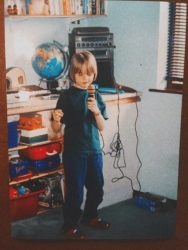
“I realised that identifying as a musician, I transcended everything to do with gender and stereotypes. Unsurprisingly, it quickly became my tactic to navigate through secondary school. As long as I was a “cool musician,” I could get away with being different.”
Bowie in a dress. Bowie in a jumpsuit. Bowie in heels. Bowie in tons of make-up. Granted, this was the opposite experience; a man presenting in a “feminine” way, but it didn’t matter; it was all I needed to know…
I was going to be a musician!
Musicians could be kooky, queer, and questionable as hell, but most importantly to me, musicians could get away with it.
Music was inescapable in our household. Whether we were cleaning, cooking, or relaxing, we’d have a constant stream of folk, soul, jukebox and rock’n’roll reverberating around the walls, and it wasn’t long before I was contributing to the mayhem. I started playing the drums when I was about ten years old; to me, they were the loudest and coolest. But I guess I needed an outlet to express what I was going through (not to mention I wanted to be the centre of attention, and you don’t get that sitting down at the back of the band.). I was inspired by classic storytellers like Billy Joel, Fleetwood Mac, and Carole King, so when my dad gifted me a guitar, I put down my sticks, taught myself some chords, and began writing.
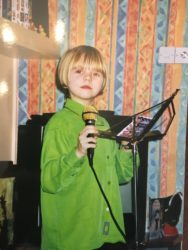
“People often ask me how I’m so positive all the time, but when you come from such unconditional love, kindness, and compassion, it’s hard to see the world any other way.”
At first, I was producing cathartic songs about feeling alone, but it wasn’t long before I found another, just as powerful, use for them: writing flirty love songs for the girls I fancied in class. As it turned out, they weren’t scared of liking me back because it wasn’t like a chick crushing on a chick; it was a chick crushing on a musician, and for some reason, that made it acceptable.
I realised that identifying as a musician, I transcended everything to do with gender and stereotypes. Unsurprisingly, it quickly became my tactic to navigate through secondary school. As long as I was a “cool musician,” I could get away with being different.
After building my identity around it, I got pretty good at the whole “being a musician” thing, and at 17, I moved to London to pursue a career in the industry. My first place was in West London, Shepherds Bush. I moved in with a friend who had set up his own recording studio. I became their in-house songwriter and started playing the underground circuit in pubs and bars to pay my rent.
It was a struggle at first, moving from a small town where everyone knew me to an explosive city where I felt tiny. It was also hard to make money for a while; we ate beans on toast for months.
But I finally had the power to explore and refine my own image and personality without any restrictions. It was a constant adventure, and I was insatiable.
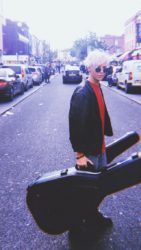
“Internally, I understood that I was a straight man who had a girlfriend. But it was just easier for the external world to perceive me as being in a same-sex relationship, so I went along with being ‘gay’ the entire time.”
One night, I was out in a place called Ku Bar in Soho when a random girl started hitting on me. I like to think this wasn’t an unusual thing; such was my confidence at the time. But the reason this particular occasion still stands out is that, after spurning her advances, I got chatting to her beautiful friend. We talked for hours and decided to see each other again the following week. Before I knew it, I was in a relationship, one that lasted the next seven and a half years.
Internally, I understood that I was a straight man who had a girlfriend. But it was just easier for the external world to perceive me as being in a same-sex relationship, so I went along with being ‘gay’ the entire time. Having said that, people often struggled to attach gender to me. A lot of the time, it was this unspoken thing; I felt like I existed outside of society’s description of gender. It was so implicit that over our seven years together, we never even discussed it. She would often say that it felt more like she had a boyfriend, though.
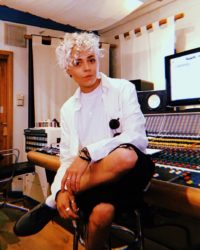
It seems crazy to me now that the whole time I was in a ‘gay’ relationship, playing live music and partying all over town, I never got to know any trans people. What’s even more curious is that I didn’t even identify as trans. I understood who I was – a boy in a girl’s body – but I never translated that to mean transgender; it just didn’t correlate in my mind.
It was only after leaving my relationship and getting reacquainted with myself as a singular entity that I really started to dive back into understanding myself and my identity. I’d started to come across people within the industry who identified as ‘transgender’ – and if I’m completely honest, to begin with, the word terrified me. The only exposure I’d ever had to similar-sounding words was in derogatory slang and slur forms, both in media and in day-to-day life.
Reflecting on this hit me hard; I knew I had to take things into my own hands and began researching as much as possible. As if the universe was listening, I then met a transgender guy at pride in London, and he connected me with a whole new world. I would read their Instagram posts and then follow more people in the same situation; this led me to YouTube, where there was an entire population of young guys describing my exact life experience. According to these people, there were actually things you could do to align your body to your identity. I went in full pursuit.
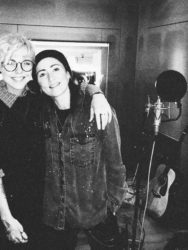
Dylan Holloway and KT Tunstall in the studio. left: Dylan Holloway | right: KT Tunstall
Meanwhile, I was out almost every night playing gigs. I was still performing to my fanbase, a significant portion of which are from the LGBTQIA+ community. I was loving it, they were loving it, but I wasn’t quite speaking my truth. I played something like 200 shows in 2019. I’d written and recorded with KT Tunstall, supported Jessie J, recorded in Bryan Ferry’s studio, and headlined five sold-out shows. My next step would be to release an album’s worth of singles over 2020 and tour the UK.
Then came the lockdown.
I wasn’t going to be able to support myself in London with no income, so it was time to move back home to Cornwall. I have an amazing relationship with my family, but I was apprehensive. I’d grown such big wings in the city; my hometown felt so very small to me now. I got my head down and spent the time writing and reflecting on my life. In London, I was free to be whoever I wanted to be; I had followed my passion and had an incredible time doing it. Yet, I realised when I got home that I still had to truly interpret and define myself.
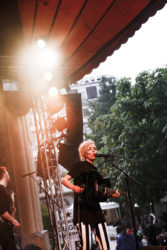
One afternoon, I was flicking through my social media and interacting with some of the trans guys I’d been following, and suddenly it hit me. The penny finally dropped. I was looking at myself in these photos. That was me represented in the stories and the videos I was watching. The one thing I’d always been searching for: I am a trans guy!
I always knew I felt like this, it’s just now I had the vocabulary to express it, and it had been staring me in the face for so long.
My current girlfriend was the first person I told. I felt so safe with her. Naturally, she was beautifully supportive. She reminded me my soul was worthy of love, regardless of the packaging. I then felt the confidence to tell my sister. She’s always been my partner in crime, and her reaction gave me further encouragement to tell our parents.
I’ve never warmed to ‘coming out’ with a label. I’ve always preferred the idea of sharing an emotional human experience. For example, I didn’t tell them I was gay when I was younger. I just said I had a girlfriend and that I loved her. They said, “you can love whoever makes you happy. They can be blue, pink, yellow, or polka dot, as long as they make you happy.”
My mind went back to that day as I walked across the beach with them. It didn’t matter how far I roamed or how big my wings grew; this would always be home.
“I’m not gay, you know,” I said. “I’m straight. I’m a straight guy. I’m just in the wrong body.”
I didn’t wait for them to respond. I felt like the moment was now; there was nothing but open landscape and glorious sand as far as the eye could see, so I just continued walking. I went on to explain that I would like them to think of me as their son because that’s who I am. That’s who I’ve always been, even if it was never said. I wanted them to see it, to feel it, and to understand it.
Once again, they exceeded my expectations.
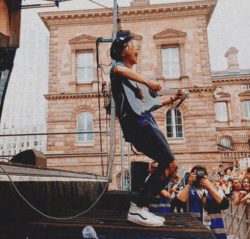
“We need to be normalising the LGBTQIA+ family until we are actually boring and no longer a trend. So that one day, kids will feel so normal within their lives, bodies, and sexuality that they don’t have to ‘come out’ and they don’t have to turn to a life in music just to feel acceptance.”
“As long as you’re going to stay the kind, caring, and sun-shining soul we’ve always known, you can be anyone, ” they replied.
They have always prioritised my happiness; how the happiness comes is merely circumstantial. People often ask me how I’m so positive all the time, but when you come from such unconditional love, kindness, and compassion, it’s hard to see the world any other way.
I’ve had my own struggles over the years, of course, but I have to acknowledge how lucky I am. Many trans and queer people are not afforded this type of love from their family and friends, which makes it even more important for me to both acknowledge and cherish.
A lot of my childhood friends still lived in Cornwall, so I decided it was time to share my experience with them. Again, I found nothing but love, a love that fortified my confidence.
After a lifetime of waiting, everything was now happening so quickly. Before the pandemic, I had sent an email to a clinic about gender-affirming top surgery. By June that year, I’d booked the appointment, and in November 2020, it was done. I remember as a child imagining what I would look like in the future, and it was always with a man’s chest. I guess I’d been manifesting it for a long time.
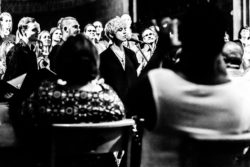
In the space of a year, all my gigs had stopped; I’d moved home, told my friends and family I was trans, and had surgery. I was proud of myself for how far I’d come during such a troubling time for everyone, but there was still one thing left to do, and it might just be the hardest thing yet.
Say what you want about social media; it can be a scary and confusing place sometimes. I consider myself a positive person, but I had to account for the fact that I was about to let around 20,000 people know that I was changing my name, and my pronouns were now He/Him. I’d built my whole life around music; it was my support system, my passion, and a large part of my identity. I’d accrued a solid following and loyal fanbase that had supported me in following my dreams. But was I about to risk it all?
On 13th December 2020, I posted an infographic with the caption “You Can Call Me Dylan.”
…and they did.
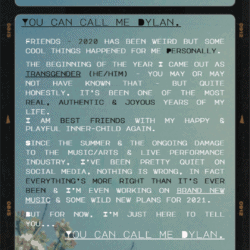
“You Can Call Me Dylan.”
If anything, I feel their love and warmth more than ever now. I guess people can relate to personal struggles, so it’s natural for them to come together and help you overcome these challenges. Even still, I’ll forever be grateful for the responses I’ve got.
Positivity has always helped me through life. I expect positive outcomes, and so far, that’s what I’ve received. I have yet to dive back into the music industry since the world has begun to open up, but I’ve played a few shows here and there. The promoters and venue owners have shown me nothing but support and encouragement, altering pronouns in bios, photographs and informing their staff to align with the changes I’ve made in my life.
I still play the same songs, I still write about the same subjects, it’s just now I can deliver them with my whole self, 100 percent authenticity. If there’s one place you can be different and accepted, it’s in music and the arts. We celebrate artists more for their positive differences than we do for their similarities. However, there is so much room for improvement. Music speaks to people in a way they want to be spoken to and teaches people how they are happy to be taught. In my eyes, music should be the front runner for championing those who can create positive changes for generations to come.
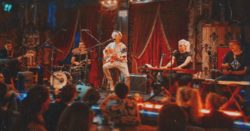
Sold Out Headline Show @ House Of Magic in 2019
There should be more events than just an annual ‘pride’ to showcase artists from the LGBTQIA+ community. There should be room on all festival line-ups for marginalised communities. Instead of being a sideshow, they should be elevated in the press as heroes who are helping break down the stigma that so many people are still facing.
We need to be normalising the LGBTQIA+ family until we are actually boring and no longer a trend. So that one day, kids will feel so normal within their lives, bodies, and sexuality that they don’t have to ‘come out’ and they don’t have to turn to a life in music just to feel acceptance.
Having said all of that, I wouldn’t trade my waltz into music for the world.


